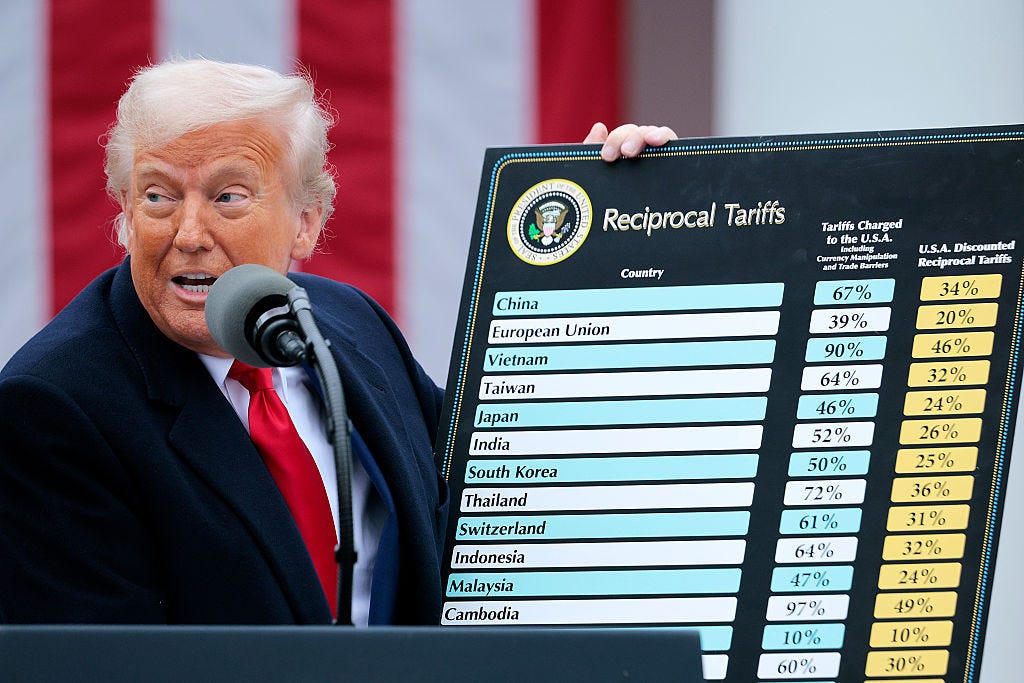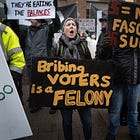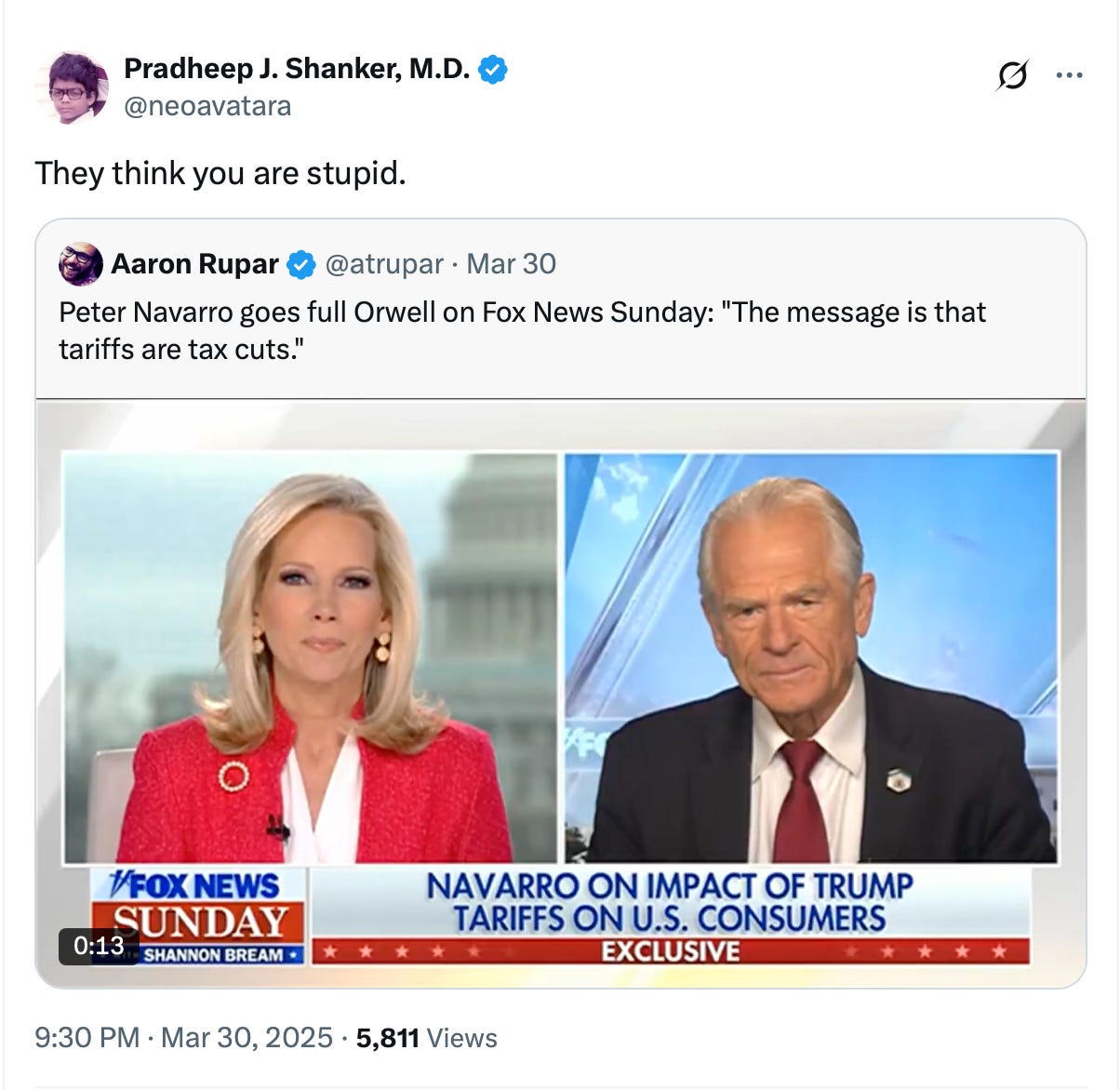FREE FOR ALL: Explaining Depression Don's war on trade
ICYMI: The “day of liberation” is upon us. What's behind our would-be king's attempt at destroying the global economy?
You may well have woken up this week, taken a look at your 401(k), and crawled back under the covers, wondering to yourself, “Why exactly does the Trump regime seem bent on crashing the world economy? Why would the richest country in history just throw it all away?”
We’ve been wondering the same, and widespread confusion as financial analysts struggled to make sense of it all and just plain gave up, the explanations are starting to come together. So we’ll walk you through it. Below you’ll find
What’s on the table, and why the calculations behind the tariffs should make anyone who struggled with Econ 101 blush — and should put us all on notice
Why economists and America’s international partners are flummoxed — and why that misses the point
What happened when the U.S. tried this before (Spoiler alert: It involved Herbert Hoover)
What the relentless spin from the Cabinet’s billionaires obscures — and why
How Senator Chris Murphy hits the nail on the head: It’s not a defense of the economy. It’s an attack on democracy
And what Americans need to demand now — before it’s too late.
Follow along as we explain.
On Wednesday afternoon, Trump took to the Rose Garden to announce his long-awaited global tariff program — the new, wall-to-wall levies the U.S. is going to charge on anything imported into the country. Payable, of course, by the Americans doing the importing, not the countries doing the exporting. The idea is to stop imports, so that Americans will turn to domestic goods instead, since they’ll be cheaper. Tariffs are an idea that can make some sense if you’re targeting some specific industry, say microchips or steel, that faces actual unfair international competition or is critical to national security. But that’s not what this is.
The supposed “Day of Liberation” is a doozy, executed with a blunderbuss rather than a scalpel, imposing a base levy of 10 percent on nearly every country in the world, including hypothetical trade partners like Svalbard’s polar bears and Heard and McDonald Islands’ penguins, and rates of up to 54 percent on major trade partners-cum-supposed adversaries like China. That’s a giant shift in the balance of international trade, outstripping even the protectionist tariffs of a century ago.
The individual rates seem to have been calculated by simply dividing our trade deficit with each country by the value of the imports we purchase from them. There’s nothing “reciprocal” about them, because they aren’t a response to anything like real-world tariffs. We’re even imposing staggering levies on countries that the U.S. has existing free-trade agreements with — meaning that they haven’t been applying any tariffs on our exports to them at all.
It’s the sort of thing a kid struggling through Economics 101 — or perhaps Elon Musk’s Grok, without any understanding of the international order or human history — might do.
Only Russia, North Korea, and a few others seem to have dodged the economic bullet for now (makes you wonder what Trump has against those penguins). But none of it makes much sense, not common sense, nor economic sense, nor policy sense.
As The Economist has it:
On economics Mr Trump’s assertions are flat-out nonsense. The president says tariffs are needed to close America’s trade deficit, which he sees as a transfer of wealth to foreigners. Yet as any of the president’s economists could have told him, this overall deficit arises because Americans choose to save less than their country invests—and, crucially, this long-running reality has not stopped its economy from outpacing the rest of the G7 for over three decades. There is no reason why his extra tariffs should eliminate the deficit. Insisting on balanced trade with every trading partner individually is bonkers—like suggesting that Texas would be richer if it insisted on balanced trade with each of the other 49 states, or asking a company to ensure that each of its suppliers is also a customer.
So, WTAF is going on? What are the Trump-Musk regime’s economic apparatchiks doing? Surely finance veterans like weak beef hater Howard Lutnick and cheap goods dismisser Scott Bessent know better than this? They must have some kind of reason for embracing this madness.
Connecticut Senator Chris Murphy has an explanation — and it’s the only one that makes any sense. Lutnick and Bessent and the rest do know better (no one can say what Trump knows, of course) — but that’s not what this is about. This is about power. Power over all of us.
The tariffs, according to Murphy, have nothing to do with economic policy, and even analyzing them as such is a mistake. They’re political, he says, “a tool to collapse our democracy.”
What Murphy’s pointing out is both critical and hard to argue with: Trump’s fascination with the William McKinley presidency aside, this isn’t even really about returning to the protectionist policies of the Gilded Age. Trump isn’t so much interested in a muscular trade policy as he is in consolidating power even further. That’s why Trump’s economic arguments don’t make any sense. The language is a weapon, not an explanation.
In short, it’s all best understood as another salvo in the Trump-Musk regime’s attack on democracy and the rules-based international order. It’s an attempt to reimpose the rule of kings in place of the rule of law. DOGE has been doing this domestically; this simply extends the effort internationally. Feudalism, brought to you by chainsaw.
The tariffs provide the Trump regime with perhaps the greatest opportunity for corruption in modern history. Observers take for granted now that Trump’s policy pronouncements are about self-dealing. But that’s been extended to cover every transaction on earth. Strike an agreement with Trump, and get an exemption from tariffs on your goods. That’s going to be the new international trade order, at least so far as the United States is involved — bend the knee, and get your blessing.
That’s what personalist rule is all about. Anti-American, anti-constitutional, and utterly anti-democratic.
Remember the American Revolution? That had something to do with the imposition of tariffs by an unresponsive, unrepresentative government that was used to using taxation as a cudgel. Getting rid of that has a bit to do with why we have the system of government we have. Or had, up until this past January 20.
Senator Murphy is telling us that it is time to demand better. And as New York City mayoral hopeful Brad Lander told us this week, it may be now or never.
The thing is, that system is still in place, at least technically. Congress could step in anytime and put a stop to this. Trump is launching this trade war using emergency powers, justified initially by the supposed influx of illicit fentanyl via the Canadian and Mexican borders, and now by an argument that blames the shrinking of U.S. manufacturing capacity on “foreign adversaries” to usurp legislative power. But there is no emergency. The notion that America’s trade partners and closest allies are conspiring to defraud the U.S. out of its rightful piece of the pie — and have been for decades — is about as close to reality as the idea that Venezuelan immigrants are conducting what amounts to a military assault on the U.S. We all know how that’s going. Kidnappings. Disappearances. The dawn of a check-your-papers police state.
So, how are Americans going to experience this?
Now, there’s been a lot of Newspeak by Trump confidantes about what tariffs are going to mean for people on Main Street. Trade counselor Peter Navarro did his best to equate tariffs with tax cuts (they are, of course, the opposite, by design)
Lutnick got out on TV and promised that the tariffs would spark hiring for an American manufacturing renaissance right away.
But they’re just lying. Nobody’s hiring, or is likely to be, because, back in reality, the world economy is in shock. The U.S. stock market is in free fall. The S&P 500 index (that’s the list of dependable stocks, not the risky bets) lost nearly $2 trillion in value at the very beginning of trading today. The Dow Jones lost more than 1,400 points. Big numbers, yes, but it’s a hit that everyone is going to feel. Right in the wallet. In the bank account. In their ability to envision and plan for the future.
For most Americans, what it all boils down to is that the only thing that’s getting liberated is their money. From their retirement accounts. Navarro’s fairy tale aside, the tariffs mean a $6 trillion tax hike. Imposed on Americans. And that’s not liberal tears — it’s according to the Wall Street Journal.
As the trade war gets underway, things are likely to get a whole lot worse. Even if people have a difficult time understanding the threat to democracy as a real threat, the threat to livelihoods on a grand scale may well be compelling.
And we have a pretty solid historical example of what happens when the United States imposes ridiculously high base tariffs across the board. The Smoot-Hawley Act of 1930, the Herbert Hoover administration’s ill-fated response (passed over the objections of most economists) to the Great Depression. International trade wasn’t anywhere near as significant a century ago, but erecting protectionist tariffs set off a trade war and exacerbated and globalized the growing Depression. The hardened conservatives at the Cato Institute even go so far as to suggest that market anxieties over trade leading up to the passage of the Smoot-Hawley Act were what kicked off the market crash in the first place.
Trump’s proposed tariff rates are even higher than the Smoot-Hawley levies. Do we really want to Make the Depression Great Again?
Nobody wants this. Not here in the United States, and not anywhere else. And by and large, the things the U.S. imports aren’t things that there are simple replacements for. Parmesan cheese, for instance:
“If Trump really imposes high tariffs, Europe will have to respond, but the paradox is that the EU would be better off doing nothing,” said Matteo Villa, a senior analyst at Italy’s Institute for International Political Studies.
“On the other hand, Trump seems to understand only the language of force, and this indicates the need for a strong and immediate response,” Villa said. “Probably the hope, in Brussels, is that the response will be strong enough to induce Trump to negotiate and, soon, to backtrack.”
Now, there are some bright spots in all of this, maybe just not for Americans. Trump has managed to get longtime adversaries China, Japan, and South Korea to the negotiating table to plan out what the future of the Pacific looks like without the U.S. Similarly, The Economist suggests that this is an opportunity for the rest of the world to create a new international trade order — without the United States in it. Maybe there’s a Nobel Peace Prize in this for Donald Trump yet.
But there’s not much for the rest of us non-billionaire Americans. And it’s time to demand otherwise.





